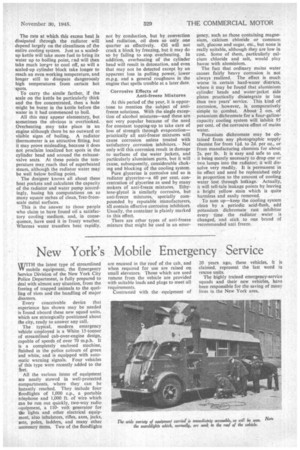New York's Mobile Emergency Service
Page 41

If you've noticed an error in this article please click here to report it so we can fix it.
WITH the latest type of streamlined W mobile equipment, the Emergency Service Division of the New York City Police Department, is fully prepared to deal with almost any situation, from the freeing of trapped animals to the quelling of riots and the handling of major disasters.
Every conceivable device that experience has shown may be needed is found aboard these new squad units, which are strategically positioned about the city, ready to answer any call.
The typical, modern emergency vehicle employed is a White 15-tonner of streamlined cab-over-engine design, capable of speeds of over 70 m.p.h. It is a completely enclosed machine, finished in the police colours of green and white, and is equipped with automatic warning signals. Four vehicles of this type were recently added to the /lee.
All the various items of equipment are neatly stowed ht well-protected compartments, where they can be instantly reached. They include four floodlights of 1,000 c.p., a portable telephone and 1,000 ft. of wire which can be run out quickly, two-way radio equipment, a 110volt generator for the lights and other electrical equipment, also inhalators, rifles, axes, jacks, nets, poles, ladders, and many other necessary items. Two of the floodlights
are encased in the roof of the cab, and when required for use are raised on small elevators; Those which are used remote from the vehicle are provided with suitable leads and plugs to meet all requirements.
Contrasted with the equipment of 20 years ago, these vehicles, it is claimed, represent the last word in rescue units.
The highly trained emergency-service squads and their new vehicles, have been responsible for the saving of many lives in the New York area.




























































